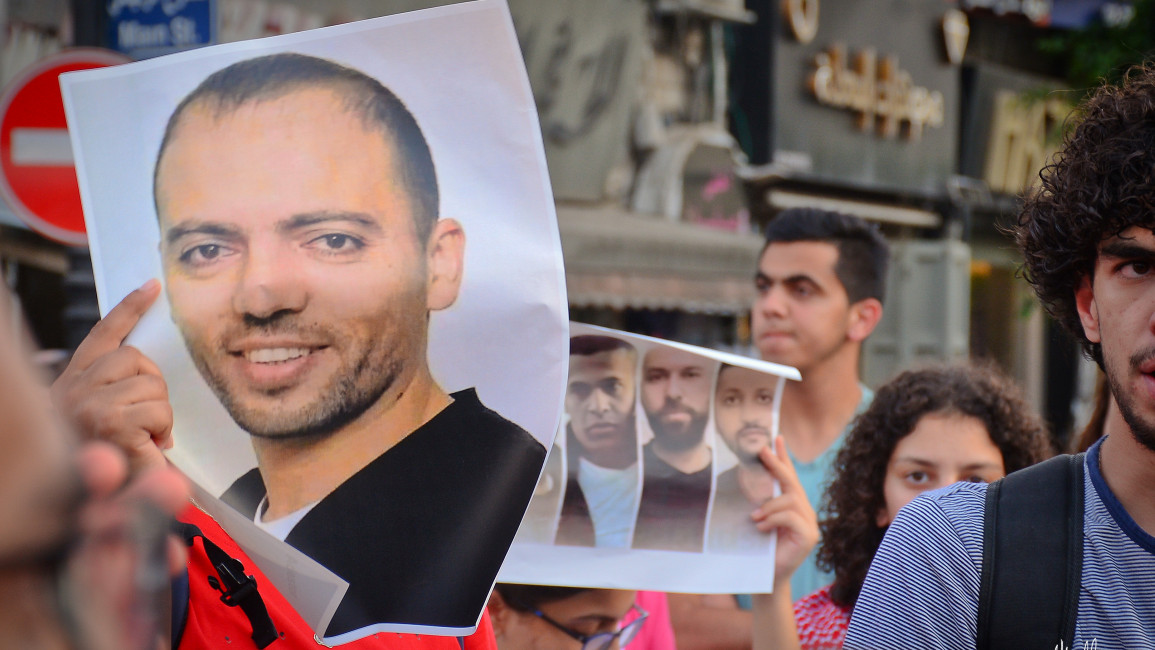Palestinians to protest on Tuesday in solidarity with prisoners held in Israeli jails
Palestinian prisoners continued their "disobedience" actions in Israeli jails for the 21st day, ahead of a mass hunger strike announced to start on 22 March against Israel's repressive measures.
On Monday, the Palestinian Prisoners' Club said that Palestinian prisoners in several Israeli jails rejected two meals since Sunday and staged night protests.
Meanwhile, Palestinian factions announced a series of protests in West Bank cities on Tuesday to support Palestinian prisoners.
"Marches will be held in West Bank cities on Tuesday night, as a response to the call of the prisoners' leadership to support their struggle," Ameen Shouman, head of the Palestinian High Commission for Prisoners' Affairs, said to The New Arab.
Are we seeing the start of a Third Intifada in Palestine?
— Miko Peled (@mikopeled) February 24, 2023
Ben-Gvir's new cruelties against Palestinian prisoners prompted a call to action. This video from Jerusalem shows civil disobedience against home demolitions and raids by Israel.
What's next? https://t.co/rPBpLV2KBD pic.twitter.com/yQoeo2eIRa
"Mobilisations will escalate in coming weeks and intensify once prisoners begin their hunger strike, according to a national plan of support to prisoners," said Shouman.
Palestinian prisoners started a series of "disobedience" campaigns in Israeli jails in mid-February to protest further repressive measures announced by Israel's new security minister Itamar Ben-Gvir.
Ben-Gvir's measures include restricting shower time and water quantity for Palestinian prisoners and restricting the quantity and quality of bread in Palestinian prisoners' meals.
Are we seeing the start of a Third Intifada in Palestine?
— Miko Peled (@mikopeled) February 24, 2023
Ben-Gvir's new cruelties against Palestinian prisoners prompted a call to action. This video from Jerusalem shows civil disobedience against home demolitions and raids by Israel.
What's next? https://t.co/rPBpLV2KBD pic.twitter.com/yQoeo2eIRa
"Protests in support of prisoners will be held with the participation of civil society too, including labour unions and popular committees," Amani Sarahneh, spokesperson for the Palestinian Prisoners' Club, told TNA.
"All civil organisations closely follow developments in the occupation jails, and protests will be held based on how things escalate in jails," she added.
"According to Israeli law, we can't make a judicial petition to suspend new repressive measures against prisoners unless all means to counter them are exhausted before these measures are passed into law," Milena Ansari, the spokesperson for Addameer Prisoner Support Association, said to TNA.
تغطية صحفية: "وقفة أمام مقر الصليب الأحمر في البيرة؛ دعماً للأسرى في سجون الاحتلال". pic.twitter.com/FZdRrg78U6
— شبكة قدس الإخبارية (@qudsn) February 28, 2023
"At the same time, Israel's repressive measures and raids on Palestinian prisoners' cells are an escalation, which is why the hunger strike will most probably happen, threatening the health and lives of striking prisoners," said Ansari.
"All this makes it very important to concentrate public opinion to oppose these measures, not only in Palestine but also internationally," she added.
Last week, Israeli prison services confiscated electric devices from Palestinian prisoners' cells at the Negev prison. Palestinian prisoners responded by refusing to leave their cells for morning counting, escalating tensions.
Currently, Israel holds some 4,780 Palestinians in its jails, including 29 women, 160 children and nearly 1000 detainees without charges, under the "administrative detention" system, according to human rights groups.


![Minnesota Tim Walz is working to court Muslim voters. [Getty]](/sites/default/files/styles/image_684x385/public/2169747529.jpeg?h=a5f2f23a&itok=b63Wif2V)





![Israeli strikes on Beirut [Getty]](/sites/default/files/styles/image_330x185/public/2176155077.jpeg?h=a5f2f23a&itok=Xq7ypWgM)
